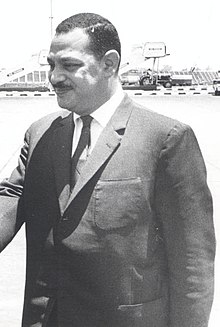Sami Sharaf
Sami Sharaf | |
|---|---|
 Sharaf in 1970 | |
| Minister of State for Presidential Affairs | |
| In office 28 September 1961 – May 1971 | |
| President | |
| Personal details | |
| Born | 20 April 1929 Heliopolis, Cairo, Kingdom of Egypt |
| Died | 23 January 2023 (aged 93) Cairo, Egypt |
| Political party | |
| Alma mater | Military Academy |
Sami Sharaf (
Early life and education
Sharaf was born in Heliopolis, Cairo on 20 April 1929.[1] His father, Mohamed Abdel Aziz Sharaf, was a physician who was trained in Edinburgh, United Kingdom, and served as the director of Beni Suef Governorate.[2][3][4] Sami had five siblings.[2]
Sharaf graduated from the Military Academy in February 1949.[1][5] One of his teachers at the academy was Gamal Abdel Nasser.[5]
Career and activities
Following his graduation Sharaf joined the army.[5] In January 1953 he was arrested in the artillery crackdown and jailed.[5] After he was freed, he began to work in the military intelligence unit.[5] He was part of the Free Officers movement's left-wing faction.[6]
Sharaf was the head of the Presidential Office.[7] He was primarily in charge of the security of the President Gamal Abdel Nasser being one of Nasser's personal support personnel.[8]
On 28 September 1961, Sharaf was named as the state minister for presidential affairs.
Sharaf served as the minister of state until 13 May 1971 when he resigned from office.[5][14] Shortly after his resignation he was arrested due to his alleged involvement in a planned coup to overthrow Anwar Sadat.[14] The reason for the arrest of Sharaf and other officials such as Sharawi Gomaa was that they had been supported by the ASU, the leftist figures affiliated with the Al Tali'a magazine, and the business elites.[15] Sharaf was sentenced to death, but in December 1971 his sentence was reduced to life imprisonment.[14][16] He was released from the prison on 15 May 1981.[5] Sharaf was among the cofounders of the Arab Democratic Nasserist Party, but later he left it.[5]
Sharaf was an anti-communist and supported the establishment of a capitalist state.[17] However, he was considered to be a Soviet agent from 1955.[18][19] Following his removal from office in 1971 Ashraf Marwan who was the son-in-law of Nasser and an intelligence officer working under Sharaf, was given the task of coordinating the intelligence affairs.[19] Sharaf published a book on his memoirs, Sanawat wa ayam ma‘ Jamal ‘Abd al Nasir: Shahadat Sami Sharaf, in 2006.[20]
Sharaf contributed to the Egyptian newspapers Al-Ahram and Al-Masry Al-Youm, and his last article appeared on 8 April 2021.[4]
Personal life and death
Sharaf was married and had four children.[1] He died in Cairo on 23 January 2023 at the age of 93.[2][21] Funeral prayers for him took place in Cairo with the attendance of Abdel Hakim Abdel Nasser, a son of Gamal Abdel Nasser.[2]
In popular culture
Sami Sharaf was one of the characters in the 1996 Egyptian film Nasser 56 and in the 2001 Egyptian film entitled The Days of Sadat.[22][23] He was featured by Slimane Dazi in The Angel, a 2018 Netflix film.[24]
References
- ^ a b c "كاتم أسرار عبدالناصر وأهم رجاله.. 50 معلومة عن الراحل سامي شرف". Al Balad (in Arabic). 24 January 2023. Retrieved 24 January 2023.
- ^ a b c d "Sami Sharaf, longtime confidant of Egypt's Nasser, dies at 94". The National. 24 January 2023. Retrieved 20 August 2023.
- ^ "Nasser's Head of Presidential Office Sami Sharaf dies at 93". Al Ahram Weekly. 23 January 2023. Retrieved 20 August 2023.
- ^ a b David Sadler (25 January 2023). "The departure of Sami Sharaf, the treasurer of Abdel Nasser.. and the prisoner of the Sadat era". Globe Echo. Retrieved 22 August 2023.
- ^ a b c d e f g h i Gamal Nkrumah (2007). "Shadows of the Revolution. Sami Sharaf". Al-Ahram Weekly. Retrieved 5 November 2022.
- ISBN 9781685855550.
- ISBN 978-1-4128-2234-3.
- JSTOR 4282729.
- S2CID 158990046.
- ^ a b Hesham Sallam (26 October 2020). "From the State of Vanguards to the House of Kofta: Reflections on Egypt's Authoritarian Impasse". Jadaliyya. Retrieved 5 November 2022.
- S2CID 153367845.
- ISBN 978-3-030-56182-6.
- ISBN 9780691101477.
- ^ a b c Raymond H. Anderson (10 December 1971). "Four Egyptians Given Life Terms". The New York Times. Retrieved 5 November 2022.
- JSTOR 45071641.
- JSTOR 4324910.
- JSTOR 41858749.
- JSTOR 2537660.
- ^ S2CID 158309394.
- S2CID 57570449.
- ^ "سامي شرف رجل يوليو وسجين التصحيح .."بروفايل"". Egypt Independent (in Arabic). 23 January 2023. Retrieved 23 January 2023.
- ISBN 978-0-520-21926-7.
- JSTOR 20688378.
- ^ Adham Youssef (24 September 2018). "The Angel, orientalism by ignorance". Daily News Egypt. Retrieved 19 August 2023.
External links
 Media related to Sami Sharaf at Wikimedia Commons
Media related to Sami Sharaf at Wikimedia Commons
